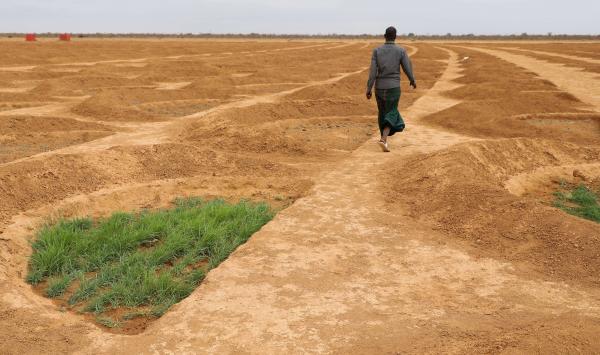WFP and UNEP sign agreement to boost food and water security
Image: A WFP-supported half-moon project at Ubaley in the Somali region of Ethiopia. Source: WFP
8 May 2023 by The Water Diplomat

On the 5th of May, the World Food Programme (WFP) and the United Nations Environment Programme (UNEP) signed an agreement designed to strengthen cooperation around various aspects touching on water and food security. The agreement was the culmination of some two years of preparatory work towards collaboration between the two UN bodies, as well as the product of a learning process between two very different organisational cultures. It was signed by Cindy McCain, the Executive Director of WFP, and Inger Andersen the Executive Director of UNEP. Specifically, the two organisations will expand collaboration on topics such as climate change adaptation, nature friendly food systems, water resources management and ecosystems restoration.
At the event, WFP’s Executive Director Cindy McCain stated: “Food and water go hand in hand: we urgently need to restore our ecosystems and scale up climate adaptation programs to ensure future generations have the basic resources needed to grow enough food ... [] ... WFP’s global footprint and operational scale, combined with UNEP’s world-class scientific expertise, will help governments, communities, and families on the frontlines of the climate crisis better protect themselves. Our partnership will reduce humanitarian needs and support long-term solutions to hunger.”
In an interview with The Water Diplomat WFP’s Sibi Lawson-Marriott further stated: ”WFP often finds itself in very remote and marginalised areas where food needs are the highest, and while we have done a lot in the field of humanitarian responses, lately we have seen that in the absence of other complementary measures, the needs will continue to spiral and skyrocket beyond the means of national government or the international community to meet. Therefore, the local food system itself must be resilient, and climate related shocks, in particular changes to the hydrological cycle, are constraining food systems far more than we had previously understood or articulated. UNEP was a logical partner in this, and we are currently focusing on how UNEP’s knowledge on ecosystems can be applied to the field for perhaps non-traditional users of such information through measures such as climate adaptation at scale, restoration of ecosystems and early warning on floods.”
Speaking at the signing ceremony, UNEP CEO Inger Andersen stated: “If we work more closely together, we can create real, meaningful impact. We can enhance climate mitigation and adaptation. We can support vulnerable populations to address nature-induced conflicts and natural disasters. We can maintain healthy, productive, and resilient ecosystems. We can deliver on both our mandates and reduce the vicious cycle of humanitarian and environmental crises.”
In an earlier statement, Inger Andersen had highlighted the effects of climate change on food production, whether in the form of droughts as in the case of the Horn of Africa, or in the case of floods in low lying delta’s as a result of sea level rise and greater intensity of storms. In 2019, she stated, of the 33 million people internally displaced, climate change was a factor in the displacement of over 70 per cent of cases. Looking forward, some estimates indicate that by 2050, climate change could internally displace 216 million people. This, she said, is also related to water challenges: by 2050 an estimated 6 billion people will face regular water scarcity due to climate change, pollution, and increasingly unsustainable levels of production and consumption.
Therefore, she argued, WFP and UNEP should work together on climate resilience and adaptation through investments in nature-based solutions and early warning systems. A second area for collaboration is nature-positive, climate friendly food systems. And thirdly, she proposed collaboration on integrated water resource management for healthy food systems.
Speaking to The Water Diplomat for UNEP, Lis Mullin Bernhardt further stated that although UNEP has a global focus, there is also a strong regional awareness about the region in which the offices are located, i.e., its headquarters in Kenya, but also offices in Sudan and Somalia. As a result, UNEP has done a lot of work to test nature-based solutions locally in Somalia and Sudan in order to help retain water during periods of drought, but also to respond appropriately in times of flooding, which is becoming increasingly common. One example of joint work already done with WFP is a rapid assessment of the so-called ASAL Counties [the arid and semi-arid lands in northern and eastern Kenya] to look at how nature-based water retention systems could be applied for the benefit of resilient food systems. This is an area of work which could be built on immediately, and which might form the point of departure of the programme going forward.
